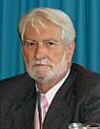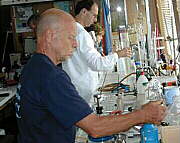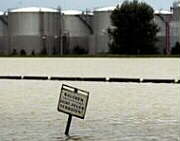
Editorial
Dear Readers,
Executive Secretary
As 2002 draws to an end we should remind ourselves of what we have achieved
this year and hint at the challenges that lie ahead of the ICPDR in 2003.
The August flood in central Europe captured a lot of public attention
and triggered massive institutional effort in the Danube countries. In
response to the flood, the first Flood Conference was held in Berlin on
September 15, ending with the German Federal Government's Five-Point Programme
to improve flood defence.
Another international conference held in Budapest on December 1 resulted
in a joint statement expressing the participants’ determination to
strengthen international cooperation on sustainable flood management.
The ICPDR responded by establishing a new Expert Group for Flood Protection
and charged it with developing by October 2004 an Action Programme for
Sustainable Flood Protection in the Danube River Basin. In addition, it
was agreed that all river basin commissions, in particular those of the
Danube, the Odra, the Elbe and the Rhine, should actively cooperate in
2003, exchange information and share knowledge in establishing adequate
mechanisms for flood prevention and control.

Under the guidance of the ICPDR River Basin Management Expert Group,
all Danube countries have made important progress this year in developing
mechanisms for the implementation of the EU Water Framework Directive.
The main achievements include the development of guidelines for the assessment
of surface and groundwater bodies, the preparation of a GIS system including
the development of an overview map for the Danube River Basin, and the
development of guidelines for economic analysis, transboundary issues
and public participation in the planning process.
The MLIM Expert Group has produced the 1998 and 1999 Yearbooks. Yearbook
2000 will be available early in 2003. The first comparative analysis of
water quality in the five-year period of 1996 – 2000 is also expected
in 2003. It will show changes over time in water quality and ecosystems
in the Danube River and its tributaries.
Results of the Danube and the Tizsa surveys have been published; summary
reports in the English and German languages, the main report containing
a complete scientific analysis of the data, and a special report on the
Tizsa survey are all available in the print form and can also be downloaded
from our website.
The EMIS Expert Group has prepared an updated list of municipal and industrial
point sources in the Danube catchment with reference year 2000. The list
has been available on the ICPDR web page since April.
On December 3, the Sava Basin Agreement was signed in Kranjska Gora (Slovenia),
establishing the modalities of cooperation between Bosnia-Herzegovina,
Croatia, Slovenia and Yugoslavia to rehabilitate navigation on the Sava
and to assure environmental protection of its waters and ecosystems. The
ICPDR, with the assistance of the UNDP/GEF Danube Regional Project will
cooperate with the Sava Initiative in preparing a pilot project for the
development of a River Basin Management Plan that would implement the
EU Water Framework Directive.
 Of
particular importance has been the development of the DABLAS database
(under the Danube-Black Sea Task Force) and the preparation of over 150
Project Fact Sheets. These projects will be prioritised and submitted
for donor support. The DABLAS Task Force expects that the first donor
meeting scheduled for early 2000will pledge funds to co-finance municipal
wastewater treatment plants in the Danube and Black Sea countries.
Of
particular importance has been the development of the DABLAS database
(under the Danube-Black Sea Task Force) and the preparation of over 150
Project Fact Sheets. These projects will be prioritised and submitted
for donor support. The DABLAS Task Force expects that the first donor
meeting scheduled for early 2000will pledge funds to co-finance municipal
wastewater treatment plants in the Danube and Black Sea countries.
Most of the activities of the ICPDR and its expert groups were supported
and reinforced by the UNDP/GEF Danube Regional Project. 16 project components
have been prepared so far and discussed with the Expert Groups and the
technical staff of the Secretariat to develop terms of reference and to
select consultants at the international and national levels. These project
components will be implemented in 2003 as an important step towards implementing
the ICPDR Joint Action Programme.
Responding to all tasks related to the implementation of the EU Water
Framework Directive and the cooperation with the UNDP/GEF Danube Regional
Project called for additional capacities to be mobilized. Therefore, new
expert bodies were created in 2002 for GIS, economics, and flood protection.
Since they all rely on technical and organizational support provided by
the Secretariat, the Secretariat will in 2003 have to draw additional
support from consultants, who will work under its guidance.
The challenge facing the ICPDR in 2003 lies in implementing numerous activities
launched this year. This will only be possible with the commitment, cooperation
and support from governments, scientific institutions and NGOs. The ICPDR
calls on all Danube countries, Contracting Parties, NGOs and cooperating
agencies, all those committed to and engaged in protecting waters and
ecosystems in the Danube River Basin, to actively support the concerted
effort to build a sustainable and healthy environment in the Danube Basin
and at the same time build and expand Europe bearing in mind our shared
historical and cultural heritage.